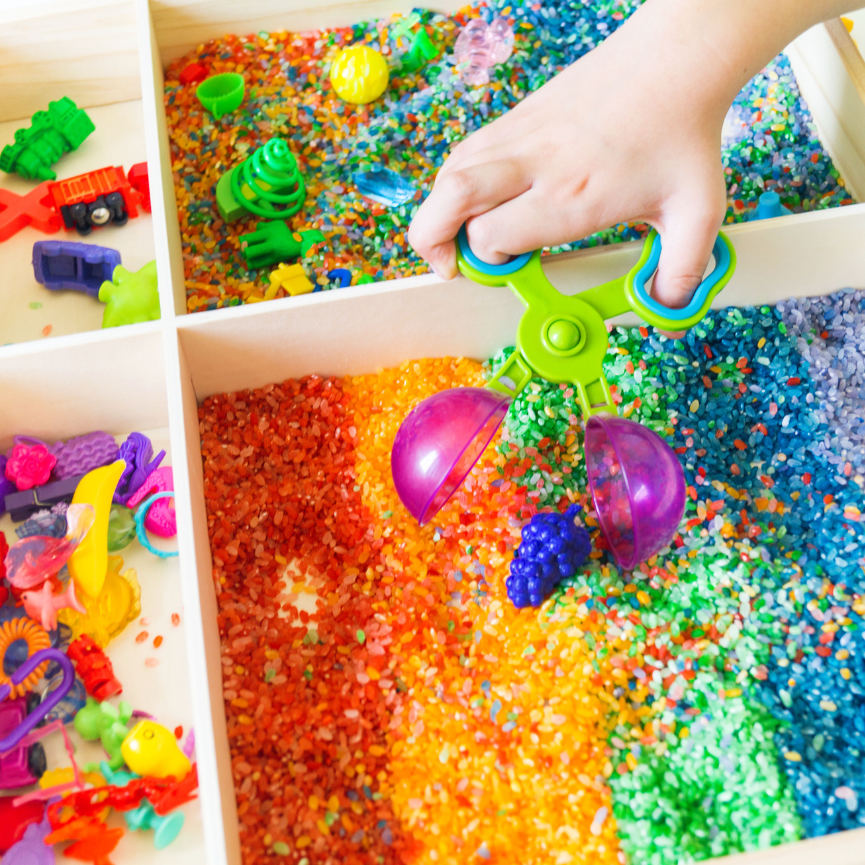
- May 09, 2024
- 183 Views
- 0 Comments
Sensory Play's Impact On Cognitive Development
Cognitive development plays a pivotal role in shaping the abilities and skills of children, particularly those with autism. Sensory play, characterized by engaging the senses through various activities, has emerged as a powerful tool in fostering cognitive growth in children with autism. This article explores the profound impact of sensory play on cognitive development, highlighting its potential to enhance learning, social interaction, and overall well-being.
Cognitive Development : Enhancing Sensory Processing Abilities
Children with autism often face challenges in sensory processing, which refers to how their brains receive, interpret, and respond to sensory information from the environment. This difficulty can manifest in two ways: heightened or diminished responses to sensory stimuli.
On one hand, some children with autism may have heightened sensitivity to certain sensory inputs. For instance, they may find certain sounds or textures overwhelming or uncomfortable. On the other hand, some children may have diminished sensitivity, requiring stronger or more intense sensory stimuli to elicit a response.
Sensory play activities offer a controlled and safe environment for children with autism to engage with a wide range of sensory experiences. These activities involve providing opportunities to explore different textures, sounds, tastes, and smells. By engaging in sensory play, children can gradually become more comfortable with sensory inputs and learn to regulate their responses.
Sensory play helps regulate sensory inputs by allowing children to have hands-on experiences with different stimuli. This active engagement helps them develop strategies to cope with sensory challenges. Through sensory play, children can learn to manage their reactions to sensory information, leading to improved sensory integration and processing abilities.
Sensory integration refers to the brain's ability to combine and make sense of various sensory inputs simultaneously. By engaging in sensory play activities that involve multiple sensory modalities, such as touching different textured materials while listening to corresponding sounds, children with autism can practice integrating sensory information from different sources. This practice promotes more efficient sensory processing and allows them to better understand and respond to their environment.
Moreover, sensory play provides a structured and predictable environment where children can gradually acclimate to sensory stimuli at their own pace. This controlled exposure helps desensitize them to overwhelming stimuli and reduces sensory sensitivities over time. It also offers opportunities for sensory modulation, allowing children to regulate their responses and find a balance in their sensory experiences.
In summary, sensory play activities offer children with autism a safe and controlled space to explore various sensory inputs. Engaging in sensory play helps regulate sensory inputs, leading to improved sensory integration and processing abilities. By gradually exposing children to different textures, sounds, tastes, and smells, sensory play assists them in managing their responses to sensory stimuli and promotes a more balanced sensory experience.
Cognitive Development : Stimulating Cognitive Skills
Sensory play is not only beneficial for sensory processing but also engages multiple cognitive processes, fostering the development of essential skills for learning and problem-solving in children, including those with autism.
One of the key ways sensory play promotes cognitive development is through hands-on exploration and manipulation. When children actively engage with sensory materials and stimuli, they stimulate cognitive functions such as attention, memory, and executive functioning.
Attention is enhanced as children focus on the sensory experience at hand. By immersing themselves in sensory play, they learn to direct and sustain their attention, which is crucial for learning and cognitive tasks.
Memory is also improved through sensory play. As children engage with different textures, sounds, tastes, and smells, they create multisensory memories. These sensory-rich experiences enhance memory formation and retrieval, helping children retain and recall information more effectively.
Executive functioning, which includes skills like planning, problem-solving, and self-regulation, is also strengthened through sensory play. The open-ended nature of sensory activities encourages children to think creatively and develop strategies to interact with and manipulate the sensory materials. For example, sorting objects by color or shape during sensory play not only supports visual discrimination but also fosters cognitive flexibility, as children adapt their thinking and problem-solving approaches based on the sensory cues.
Furthermore, sensory play provides a rich and stimulating environment that promotes the integration of different senses. When children engage in activities that involve multiple sensory modalities, such as combining touch and sight, they are actively integrating and processing information from different sensory channels. This integration facilitates connections between different areas of the brain, supporting holistic cognitive development.
By encouraging cognitive processes like attention, memory, and executive functioning, sensory play enhances children's cognitive abilities and lays a strong foundation for learning and problem-solving. The interactive and hands-on nature of sensory play creates opportunities for children to engage their senses, explore their environment, and develop critical cognitive skills essential for their overall cognitive development.
Cognitive Development : Encouraging Language and Communication
Language and communication challenges are prevalent among children with autism, but sensory play provides a valuable context for fostering language development and communication skills.
Sensory play offers a rich and engaging environment where children with autism can enhance their language skills. Through interactive play, children have opportunities to express themselves, engage in turn-taking, and practice communication in a meaningful context.
Expressive language skills are promoted during sensory play as children engage in activities that require verbal expression. For instance, they may describe the sensations they are experiencing, share their preferences, or communicate their reactions. This practice allows children to actively use language to convey their thoughts, feelings, and experiences, thereby improving their expressive language abilities.
In addition to expressive language, sensory play also facilitates the development of receptive language skills. Children engage in sensory activities that incorporate verbal and non-verbal communication cues. They learn to attend to and comprehend instructions, follow directions, and understand the meaning of words and phrases used in the context of sensory play. This exposure to language in a meaningful and interactive setting enhances their receptive language abilities.
Sensory play also promotes turn-taking, which is an important aspect of social communication. Taking turns during sensory activities encourages children to wait, listen, and respond appropriately, thereby improving their conversational skills and understanding of social communication dynamics.
Moreover, sensory play exposes children to a variety of stimuli, objects, and materials, which expands their vocabulary. They encounter new words related to different textures, sounds, tastes, and smells, thereby enriching their vocabulary repertoire. Naming and describing sensory experiences during play contribute to vocabulary development, allowing children to learn and use new words in a relevant and engaging context.
By incorporating both verbal and non-verbal communication, sensory play provides children with autism a holistic platform for language development. The interactive nature of sensory play encourages active participation, self-expression, and the acquisition of new vocabulary. Through these experiences, children can improve both their receptive and expressive language abilities, enhancing their overall communication skills.
Cognitive Development : Promoting Social Interaction
Sensory play has the potential to significantly impact social interaction among children with autism by serving as a catalyst for social engagement and the development of vital social skills.
Group sensory activities provide a structured platform for shared experiences, turn-taking, and collaboration. When children with autism engage in sensory play with their peers, they have the opportunity to interact, communicate, and connect with one another. The shared sensory experiences create a common ground for engagement and promote social interaction within a supportive and enjoyable setting.
Participating in sensory play with peers encourages social engagement and cooperation. Children can learn to take turns, share materials, and work together towards a common goal. These collaborative interactions foster essential social skills such as joint attention, sharing, and compromising, which are crucial for successful social interactions both during play and in other contexts.
Sensory play also facilitates the understanding and interpretation of non-verbal cues. As children engage in sensory activities, they are exposed to various non-verbal communication signals, such as facial expressions, gestures, and body language. Through observation and practice, they develop a better understanding of these cues and learn how to interpret and respond to them appropriately. This improved understanding of non-verbal cues extends beyond the sensory play setting, positively impacting social interactions in various situations.
Furthermore, sensory play offers a supportive environment where children can experiment with social roles and practice social rules. They can engage in pretend play scenarios, take on different roles, and experiment with different social dynamics. This experimentation allows them to develop their social skills, build empathy, and gain a deeper understanding of social norms and expectations.
By providing opportunities for social interaction, cooperation, and the interpretation of non-verbal cues, sensory play contributes to the development of vital social skills in children with autism. Engaging in sensory play with peers not only fosters social engagement and collaboration but also enhances their ability to navigate and interact successfully in social settings outside of the play environment.
Cognitive Development : Boosting Emotional Regulation
Emotional regulation can be a significant challenge for children with autism, but sensory play provides a safe and controlled environment for them to explore and manage their emotions effectively.
Engaging in sensory activities that offer deep pressure or proprioceptive input can have a calming effect on children with autism. These activities, such as using weighted objects, engaging in physical movements, or experiencing tactile stimulation, provide a sense of comfort and security. The deep pressure or proprioceptive input helps regulate the sensory system, leading to a reduction in anxiety and promoting emotional regulation.
Sensory play offers a unique opportunity for children to engage their senses and experience different sensations. By actively participating in sensory activities, children with autism can become more aware of their sensory experiences and learn to identify and manage their emotional responses. This heightened self-awareness allows them to recognize and address their emotional needs more effectively.
The calming effect of sensory play extends beyond the play session itself. When children with autism learn to regulate their emotions during sensory play, they develop strategies that can be applied in other areas of their lives. They can transfer the skills and techniques they acquire in sensory play to various real-life situations, resulting in improved emotional regulation overall.
By providing a safe and controlled environment, sensory play offers children with autism a means to explore and manage their emotions in a supportive manner. The calming effects of sensory activities, coupled with increased self-awareness, empower children to regulate their emotional responses, reduce anxiety, and enhance their overall well-being. Sensory play serves as a valuable tool in helping children with autism develop the skills necessary for emotional regulation, contributing to their overall emotional and psychological health.
Sensory play has a significant impact on the cognitive development of children with autism. By providing a rich and stimulating environment, sensory play enhances sensory processing abilities, stimulates cognitive skills, encourages language and communication, promotes social interaction, and boosts emotional regulation. Incorporating sensory play into the daily routine of children with autism can be a transformative approach to support their overall cognitive growth, leading to improved learning outcomes and quality of life.



Comments - 0 comments till now